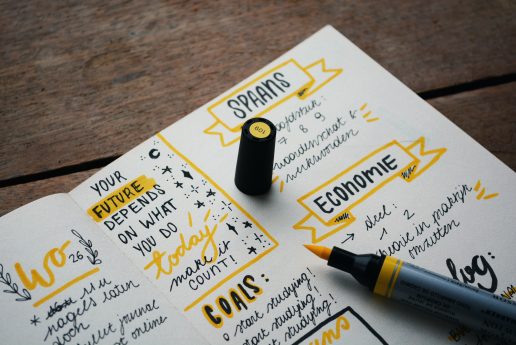We’re entering not just a new year, but a new decade. Many people find this a meaningful time for reflection and renewed goal setting. Have you been thinking about your New Year’s resolutions? Or things you want to change in your life generally? But you’re still not sure what to focus on in 2020? Are you finding it hard to come up with more meaningful resolutions to break away from the conventional ones, like living a healthier lifestyle, or planning to visit a far-away friend? Apparently, you are not the only one facing this challenge.
I receive many requests from people to help support them with creating meaningful resolutions that they can stick to. A difficult challenge at first, I thought. But later it dawned on me that many of the goals that people focus on are either too far away from the meaningful stuff they do day-to-day or they’re goals generally associated with the New Year’s resolution tradition.
Forward relevance
About 50% of people make New Year’s resolutions. But only 10% of the people who make them have fulfilled their goals by year-end. There are many reasons why people don’t stick to their resolutions—e.g., a lack of commitment, a dip in motivation, lack of resources, or loss of interest. Though this is difficult to solve on an individual basis, there are some great strategies you can use to help you achieve your goals. One specific strategy I want to highlight in this article to help you fulfill your New Year’s resolutions is something I call ‘forward relevance.’ Forward relevance is a personal strategy of designing meaningful (actionable) goals that help you create your future self, instead of looking at your past self to overcome deficits or break habits.
The first step in this process is to create relevance. A great way to do this is to: (1) find something you are actively engaged in on a daily basis, (2) identify the latest trends within this activity, and (3) connect these trends to the goals you would like to achieve. This way, forward relevance finds goals that are meaningful for you to achieve and relevant to the year you are doing it in. This, in turn, creates a deeper connection between you and your environment, the people involved in helping you achieve your goals, and the timeframe in which you do it.


Personal goals + Relevant issues + Others
/ Time frame
= Forward relevance
Applying forward relevance to trending events
For most of us, work is something we are deeply involved in on a daily basis. So, connecting New Year’s resolutions to the work environment is a great way to make your goals transcend the self. I want to share with you some key workplace trends along with suggestions for related actionable goals (that you’ll hopefully find meaningful.)
Continuous education
As the rate of change is surpassing the rate of learning, people need to keep up with continuous development and education. Global mobility and technology are radically changing what we learn and how we learn. And, as past results are no longer an indicator of future success, continuous education is your gateway to “lifetime employability” in the 21st century.
Forward relevance: Create a mindset for continuous education
Actionable goals
- Identify an area or subject you feel passionate about, but have not learned anything about yet.
- Commit yourself to continuous learning through taking a couple of online courses. For example, you could complete a MOOC (Massive Open Online Course), attend a masterclass, learn on the job, or enroll in a professional degree program.

Digital skills gap
Digital competencies are becoming one of the most in-demand skillsets by employers today. Every business today is a digital business and, with the rise of Artificial Intelligence (A.I.) and the Internet of Things (I.O.T.), digital skills requirements are on the rise. However, fewer people are focusing on or able to fulfill technical skills requirements, leading to a global digital skills gap. Conversely, it is becoming easier to build digital competencies thanks to new online platforms and apps that require less programming and coding knowledge.
Forward relevance: Enhance your digital skills in 2020
Actionable goals
- Take a course in digital marketing, programming, machine learning, or coding. This will be crucial for staying relevant in 2020, and beyond.
- Build online presence, products, and services, or even algorithms using easy-to-use online platforms and apps.
Workplace wellbeing
Employee wellbeing and health is high on the agenda in 2020 for most organizational leaders. Studies show that happy and healthy employees are more engaged at work, more committed to their jobs and organizations, feel more resilient, and are more productive. In today’s business world, talent is contingent upon organizational survival. Ensuring that companies create a culture in which employees can thrive is critical to organizational success. Initiatives to integrate physical and mental wellbeing into organizational performance management will continue to rise through 2020 and beyond.
Forward relevance: Focus on your physical and psychological wellbeing
Actionable goals
- Actively take part in (or organize) group mindfulness, yoga, or running classes to give your health, mind, and physical performance a boost.
- Create a social media support group to engage others in your wellbeing efforts. Through this you can provide support and strategies to your social networks and make new friends who have similar interests. Combined offline and online strategies are a great way to work on your wellbeing.

Precarious work
Flexible working conditions, otherwise known as precarious work, have been on the rise for the past ten years. And, according to statistics, they’ll only continue to grow. Changes in labor regulation, globalization, technology, and pressures on labor costs, have given way to various flexible work arrangements (e.g., part-time work contracts, telework set-ups, contingency and freelance based work), lowering the number of full-time employees. Studies show that precarious work arrangements have both benefits and disadvantages to organizations and employees.
Forward Relevance: Boost your ‘lifetime employability’
Actionable goals
- Identify and enhance your transferable skills. Work on developing skills that you can use in different organizations or for your own business.
- Working part-time or on a contract basis can allow you to be more flexible as to when and where you work. Work progressively toward finding the perfect work arrangements to facilitate a good work-life balance.
One last note…
Finding a meaningful resolution to focus on is just 25% of achieving your goals. Aside from applying forward relevance to help you achieve your goals, download my five effective strategies to help you make them stick!


Make the most of what your career has to offer with a Masters in International Business from Hult. To learn more, take a look at our blog about lifelong learning opportunities at Hult. Or, give your employability a huge boost with an MBA in international business. Download a brochure. Get in touch today to find out how Hult can help you understand business, the future, and yourself.


